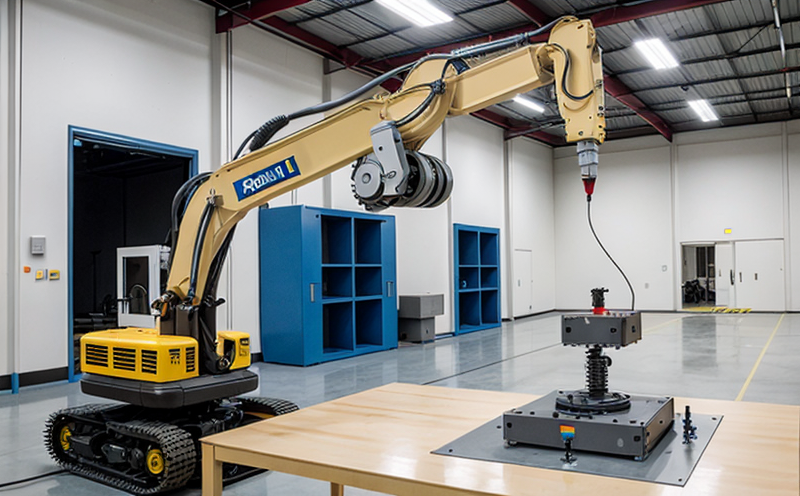ASTM D7410 Precision of Robotic Servo Drives
The precision of robotic servo drives is crucial in ensuring reliable and accurate motion control within robotics applications. ASTM D7410, titled “Precision of Test Method for Determining the Performance of Robot Motion Control Systems”, provides a standardized approach to evaluating the precision and repeatability of robotic servo drives. This service ensures that robotic systems meet stringent performance criteria, which is essential in sectors such as automotive manufacturing, aerospace, and medical device production.
The test method described in ASTM D7410 involves measuring the position accuracy and repeatability under various conditions, including load changes, environmental factors, and operational parameters. By adhering to this standard, manufacturers can verify that their robotic systems perform consistently across different applications and environments. This precision is critical for industries where even minor deviations could lead to significant errors or safety hazards.
During the testing process, a series of predefined test cycles are conducted to evaluate the servo drive’s ability to maintain precise motion control. These tests typically include:
- Positioning accuracy under static and dynamic conditions
- Repeatability over multiple executions of the same movement
- Response time to command changes
- Effectiveness in handling varying loads
The test setup involves a robotic arm equipped with sensors that provide feedback on position, velocity, and acceleration. The data collected during these tests is analyzed using statistical methods to determine the precision of the servo drive’s performance.
This service not only ensures compliance with ASTM D7410 but also provides valuable insights into how different factors affect the performance of robotic systems. By understanding these factors, manufacturers can make informed decisions about system design and optimization, leading to more efficient and reliable robotic solutions.
| Standard Reference | Description |
|---|---|
| ASTM D7410 | Precision of test method for determining the performance of robot motion control systems. |
| ISO 9283:2015 | Robotics and automation - Performance testing of robotic manipulators. |
| EN ISO 9283:2017 | Performance testing of industrial robots. |
The precision of robotic servo drives is a key factor in ensuring the reliability and accuracy of robotic systems. By adhering to ASTM D7410, manufacturers can verify that their systems meet stringent performance criteria, which is essential for industries such as automotive manufacturing, aerospace, and medical device production.
Why It Matters
The precision of robotic servo drives directly impacts the accuracy and reliability of robotic systems. In sectors like automotive manufacturing, where precision is critical for quality control and safety, even minor deviations in motion can lead to significant errors or safety hazards. By ensuring that robotic servo drives meet the precision criteria outlined in ASTM D7410, manufacturers can verify that their systems perform consistently across different applications and environments.
For compliance officers and R&D engineers, this service is essential for maintaining regulatory compliance and driving innovation. Ensuring that robotic systems meet rigorous performance standards helps to build trust with customers and stakeholders, while also providing a foundation for continuous improvement in design and manufacturing processes.
In the context of quality management, precision testing plays a vital role in identifying potential issues early in the development process. By detecting inconsistencies or deviations from expected performance early on, manufacturers can address these issues before they become costly problems in production.
For procurement teams, this service ensures that they are sourcing high-quality components and systems for their robotic applications. By specifying compliance with ASTM D7410 as a requirement in their supplier evaluation process, organizations can ensure that they are procuring products that meet the highest standards of performance and reliability.
Applied Standards
| Standard Reference | Description |
|---|---|
| ASTM D7410 | Precision of test method for determining the performance of robot motion control systems. |
| ISO 9283:2015 | Robotics and automation - Performance testing of robotic manipulators. |
| EN ISO 9283:2017 | Performance testing of industrial robots. |
The precision of robotic servo drives is a key factor in ensuring the reliability and accuracy of robotic systems. By adhering to ASTM D7410, manufacturers can verify that their systems meet stringent performance criteria, which is essential for industries such as automotive manufacturing, aerospace, and medical device production.
Quality and Reliability Assurance
Ensuring the precision of robotic servo drives is critical for maintaining quality and reliability in robotic systems. The process begins with careful selection of test equipment that accurately measures position, velocity, and acceleration. This equipment must be calibrated regularly to ensure consistent results.
The testing environment plays a crucial role in assessing the performance of robotic servo drives. Factors such as temperature, humidity, and vibration can all affect the precision of motion control systems. Therefore, tests are conducted under controlled conditions that simulate real-world operating environments.
Data collected during these tests is analyzed using statistical methods to determine the precision of the servo drive’s performance. This data provides valuable insights into how different factors affect the system’s performance, allowing manufacturers to make informed decisions about design and optimization.
In addition to testing individual components, this service also evaluates complete robotic systems. By simulating real-world applications, manufacturers can identify potential issues early in the development process. This proactive approach helps to ensure that robotic systems meet rigorous performance criteria and are reliable across a wide range of conditions.





